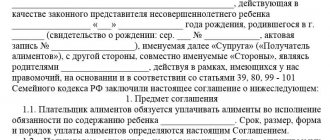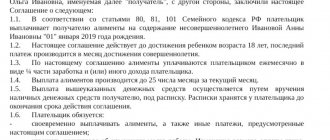From birth, their parents are required to take care of young children. And not only at the call of a loving heart, but also in accordance with the family legislation of the country. One of the parents who does not live in the family must pay child support until the children reach adulthood, until they grow up and can earn money themselves. Many parents hope that their adult children will take care of them in old age as responsibly as they did themselves.
However, life experience shows that there are situations when the father and mother have to support disabled adult children until they are very old. And not only to those parents who live with the child, but also to those who left the family a long time ago, and perhaps created a new unit of society. However, this fact does not relieve him of the obligation to support adult disabled children, since they have the right to receive alimony.
The law guarantees the right to alimony for disabled adult children
Most often, an adult disabled child continues to be cared for by his parents. They voluntarily take care of him, provide him with housing, and take him to treatment and recreation. According to Article 85 of the Family Code of the Russian Federation, the responsibility for maintaining disabled adult children lies with both parents. Even when they themselves reach retirement age, responsibility is not canceled. This means that if one of the parents voluntarily does not want to allocate funds to provide for disabled children, then alimony may be collected from him.
Customer Reviews
Thanks to Mavrichev S.V. from Bars Dan A. I thank the wonderful Lawyer Sergei Vyacheslavovich Mavrichev for thorough, competent advice and human mutual assistance to all his clients who are in deep need of qualified and timely legal and psychological advice.
Leopard Dana A. 09/18/2018
Gratitude from Alexey Shubakov Many thanks to Sergei Vyacheslavovich for the complete and detailed consultation. I have not encountered legal assistance before, but now, with a very favorable impression, I will definitely apply again in the future.
Shubakov Alexey 10/17/2018
Thanks to A.I. Ivanov I would like to express my gratitude to the team of the “Legal Agency of St. Petersburg”, and especially to Artem Igorevich Ivanov, for the competent actions and decision in my civil case. I dare say that this is one of the best law firms in the city, because... I became very close to the lawyers. Everything is done in a timely manner and to the point. Good luck to the team in everything.
Sincerely, Nadezhdin A.N. June 7, 2018
Gratitude from Rusanova N.V. I sincerely thank Konstantin Vladimirovich Ivanov and Sergei Vyacheslavovich Mavrichev for the qualified information assistance provided in a friendly atmosphere of communication, as well as for providing the opportunity to obtain guaranteed legal support in the future.
Rusanova Natalya Viktorovna, Associate Professor of the Department of Russian Language and Literature of St. Petersburg Mining University.
Thanks to Stepanov D.Yu. from Shcherbakova T.I. I would like to express my deep gratitude to Denis Yuryevich Stepanov for the very competent, highly qualified handling of my difficult case of terminating a contractual agreement with a problematic developer, who repeatedly postponed the completion of construction and completely ignored our claims (from other legal companies). The claim and complaints of Denis Yuryevich put everything in its place quickly enough, saving us from the threat of penalties from the developer, who unlawfully included them in the contract. Good luck to you in defending our legitimate interests! Thank you!
Sincerely, Shcherbakova T.I. 04.12.2017
Feedback from Goncharova I, Venera Konstantinovna Goncharova, express my gratitude to Andrey Valerievich Ermakov, Yana Maksimovna Matveeva, Daria Vasilievna Kutuzova and the entire team. I would like to note that the work was completed within the agreed time frame and with good quality. They showed a professional approach and excellent organization of work. I would like to express my gratitude to the entire team for their high-quality work and wish you further development of your company.
Sincerely, Goncharova Venera Konstantinovna.
Letter of thanks
Gratitude from Loseva S.I. I express my deep gratitude to Sergei Vyacheslavovich (lawyer of the firm) for his very clear, accessible help in solving my problem (protecting rights as a consumer). This is the second time I have contacted you to solve my problems. Always everything......and in full.
With gratitude, Svetlana Ivanovna Loseva, 02/15/2019
Gratitude from Soboleva E.P. I would like to express my deep gratitude to Vasily Anatolyevich Kavaliauskas for his literacy, consultation and attention to the client who found herself in a difficult situation; as well as wonderful, sensitive administrators. I wish the company prosperity and good clients.
Sincerely, Soboleva Elena Petrovna. September 19, 2018
Gratitude from N.S. Khokhlov I am Khokhlov N.S. I express special gratitude to lawyer A.V. Pavlyuchenko who defended my consumer protection rights. I was pleasantly surprised by his professionalism, where he discovered the false address of my defendant registered in the Unified State Register of Legal Entities, and also defended me, as I believe, from the unreasonable decisions of the trial judge. If I need legal assistance in the future, I will only turn to A.V. Pavlyuchenko.
N.S. Khokhlov December 12, 2017
In what cases is alimony collected for disabled adult children?
- If one of the parents lived separately from the family and paid alimony for the maintenance of the child, then his obligation by law ends when the child reaches the age of eighteen. Parents are not required to provide for adult children. But this does not apply to disabled adults if they receive group I or II disability. Although they will be assigned a pension or other benefit from the state, as is known, such funds for treatment and full-fledged care are not enough. Therefore, they can exercise their legal right to child support from their parents and file a lawsuit. If for health reasons they cannot do this personally, then parents, educators, and guardians with whom the plaintiffs live can act on behalf of adult children.
- It is believed that disabled people of group III can work part-time or in enterprises with easier working conditions. Therefore, the law does not oblige parents to pay alimony for adult children with disability group III. And yet, this category of people has the right to go to court to recover financial assistance from their parents. The court will take into account:
- availability of the opportunity to get a job with specific working conditions;
- the health status of the plaintiff and defendant;
- income level and family composition of the parent from whom alimony is to be collected.
Consequences of non-payment
The law provides several ways to prosecute for non-payment of alimony. The severity of the punishment depends on whether the person obligated to pay alimony is a persistent defaulter, or whether the failure to pay occurred once and for a good reason, or whether the parent is incapacitated. There are also several types of liability:
- civil;
- administrative;
- criminal
Civil liability involves the addition of interest to the principal amount as a penalty, which is half a percent of the debt amount per day. This measure is applied when the creditor applies to the court with a claim to collect the debt and penalty.
Administrative measures include fines, seizure of property and bank accounts, restriction of the right to travel within and outside the country, and confiscation of driver's licenses. The bailiff service is involved in these types of liability.
Criminal liability arises in the event of malicious non-payment in the event that alimony was not paid for the maintenance of minors. It may include various preventive measures, from correctional labor to imprisonment for a period of one year.
Is child support due to an adult child who does not work?
An adult child may not work not only for health reasons, but also for the reason that he does not yet have a specialty. The education of adult children by all indicators requires financial assistance from parents. Most of them do not refuse this, regularly providing financially for their child until graduation from a higher or secondary specialized educational institution.
Here, the voluntary initiative of the parents themselves is clearly visible, since the RF IC does not provide for the payment of alimony or other financial assistance without fail. In this case, the adult is not considered disabled.
Although the family legislation of some countries legally obliges parents to support their adult children who are full-time students. In this case, the student’s age should not exceed 23 years. It is assumed that by this time he should graduate from school. If, during the specified period, a child receiving alimony from his parents creates his own family, then the parents are relieved of the obligation to support him financially.
conclusions
- The RF IC provides for cases of payment of alimony in favor of adult children.
- To do this, two conditions must be met: need and disability.
- The disability group is not taken into account.
- Both conditions must be present simultaneously.
- Child support for adult children is paid in a fixed amount.
- When an adult studies in a full-time educational institution, the period of alimony payments is not subject to automatic extension.
- Alimony can be obtained in court or by mutual agreement, which is drawn up in writing and certified by a notary.
- After 18 years, it is possible to collect arrears of alimony, taking into account the statute of limitations of three years. If the money was not paid due to the fault of the debtor, this deadline is not observed.
How is the right to child support for disabled adult children exercised?
Alimony for disabled adult children can be provided in two ways:
- under a voluntary child support agreement concluded between the child and one or both of his parents. The document requires mandatory certification at a notary office in order for it to acquire the status of a writ of execution;
- by a court decision, if the parents or one of them refuse to voluntarily provide financial assistance to their disabled adult child. An application to the court for the recovery of payments is submitted on behalf of the recipient himself, unless he is declared incompetent by a court decision. If there is such a decision, the application is submitted by an officially appointed guardian, who can be one of the parents.
Both in a voluntary agreement and in a court decision, the payment of alimony must be assigned in a fixed sum of money, as required by paragraph 2 of Article 85 of the RF IC. If in the first case the amount of payments is discussed by the parties to the agreement themselves, then many factors play a role when making a court decision:
- the level of living wage adopted for a given category of the population in the region of residence (if such an indicator is not accepted, the federal criterion is taken as a guideline);
- health status of disabled children, employment opportunities, need for third-party care, treatment costs, living conditions;
- the financial situation of the defendant, the composition of his family, the presence of dependent relatives, as well as his state of health.
For disabled people of groups I and II, alimony payments are assigned for life, but their amount can be revised downwards or upwards. A lawsuit is filed both at the initiative of the payer and at the initiative of the recipient. The conditions for termination of cash payments are regulated by Article 120 of the RF IC.
Trial
Alimony cases are heard in the magistrate's court at the place of residence of the plaintiff or defendant. The exception is cases when paternity (maternity) is disputed or established, the amount of the claim exceeds 500 thousand rubles, or the involvement of third parties is necessary.
Based on the requirements of Art. 153 and art. 154 of the Code of Civil Procedure of the Russian Federation, such cases are resolved before the month period expires from the day the claim was accepted. The court notifies the place and time of the court hearing. The decision comes into force one month from the date of its final execution (if there is no appeal). It must be implemented immediately. This means that a writ of execution is issued (or sent at the request of the plaintiff for execution) immediately after the decision is adopted.
Note! Based on the provisions of Art. 333.36 of the Tax Code of the Russian Federation, there is no need to pay a state fee when filing a claim for alimony. The defendant is obliged to pay it in the amount of 150 rubles in the event of a positive outcome of the case for the plaintiff.






